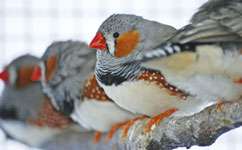January 10, 2012 report
Telomere length in young zebra finches predicts lifespan

(PhysOrg.com) -- For hundreds, if not thousands of years scientists have been seeking clues to explain why we humans, and all other animals for that matter, age. But it’s been only recently that some real clues have been found, and many of them center around telomeres, the caps that sit on the ends of chromosomes and prevent them from fraying. Now, in a new study by Pat Monaghan and colleagues at the University of Glasgow, it appears that at least with zebra finches, telomeres may serve as a predictor of longevity. In their study published in the Proceedings of the National Academy of Sciences, they found that longer telomere length in the birds when they were young, pointed to a longer lifespan.
Because telomere length has been thought to have ties to longevity, Monaghan and her team decided to study them more thoroughly. Previously, researchers have taken samples just once or twice with individual test animals; Monaghan thought that wasn’t enough, so she and her team set about taking samples from 99 zebra finches periodically over their entire lifetimes to see if any pattern might emerge. And of course one did; they found that samples taken at 25 days old proved a reliable predictor of average longevity for a group. Longer telomeres meant a longer life.
Monaghan chose zebra finches for the study because they are relatively long-lived species of animal, but not so long-lived that it would take the rest of her own life to study them. The birds typically live for a little less than ten years, though it’s not uncommon for them to die younger. In fact, in the study, nearly half of the birds died before reaching half that age. Also, though the cause of death in the birds wasn’t tracked, the team did make sure that it wasn’t due to infection, predators or accidents.
Monaghan and others in the field are quick to point out that the results of this study should not be seen as an indication that telomere length in young human beings could provide the same sorts of clues to longevity, as that would be a rather giant leap in logic; though it does seem logical that such an experiment should be done with people, as doing so requires nothing more than a simple blood test every few years.
The next step for the group will be to try to determine if the telomere length at 25 days for the finches is heredity or comes about due to some unknown environmental factors.
More information: Telomere length in early life predicts lifespan, PNAS, Published online before print January 9, 2012, doi:10.1073/pnas.1113306109
Abstract
The attrition of telomeres, the ends of eukaryote chromosomes, is thought to play an important role in cell deterioration with advancing age. The observed variation in telomere length among individuals of the same age is therefore thought to be related to variation in potential longevity. Studies of this relationship are hampered by the time scale over which individuals need to be followed, particularly in long-lived species where lifespan variation is greatest. So far, data are based either on simple comparisons of telomere length among different age classes or on individuals whose telomere length is measured at most twice and whose subsequent survival is monitored for only a short proportion of the typical lifespan. Both approaches are subject to bias. Key studies, in which telomere length is tracked from early in life, and actual lifespan recorded, have been lacking. We measured telomere length in zebra finches (n = 99) from the nestling stage and at various points thereafter, and recorded their natural lifespan (which varied from less than 1 to almost 9 y). We found telomere length at 25 d to be a very strong predictor of realized lifespan (P < 0.001); those individuals living longest had relatively long telomeres at all points at which they were measured. Reproduction increased adult telomere loss, but this effect appeared transient and did not influence survival. Our results provide the strongest evidence available of the relationship between telomere length and lifespan and emphasize the importance of understanding factors that determine early life telomere length.
Journal information: Proceedings of the National Academy of Sciences
© 2011 PhysOrg.com















